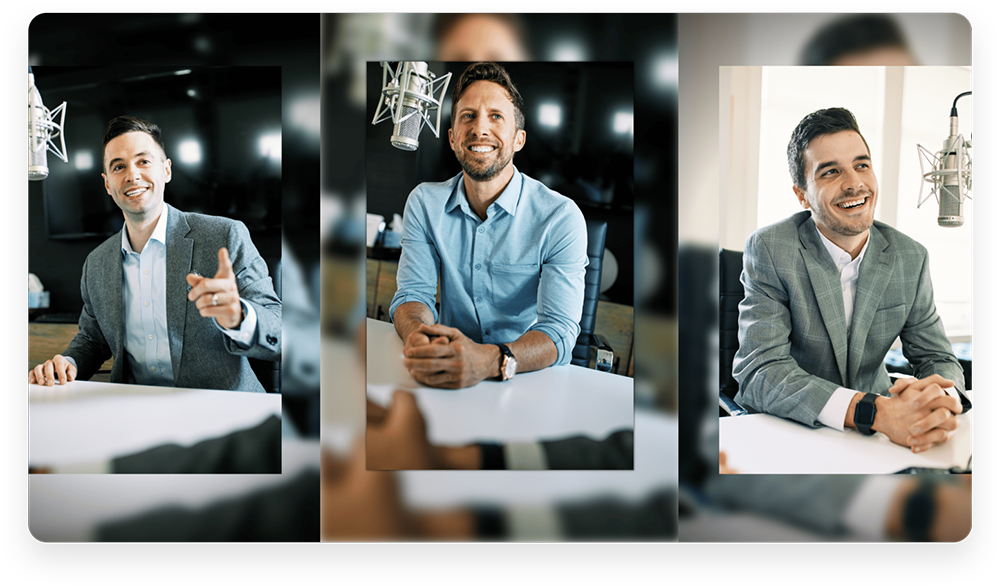Retire While You Work® Podcast
Join us as we discuss various topics to help you find the path to viewing money as a means to the true currency, TIME, and learn how to build more memories and experiences.
View All EpisodesJoin us as we discuss various topics to help you find the path to viewing money as a means to the true currency, TIME, and learn how to build more memories and experiences.
View All Episodes
What if you could do what you're passionate about and achieve a work-life balance? What if you were relieved of the pressure to have some massive amount saved?
Learn More
It’s no secret that the COVID-19 pandemic from 2020 has altered how nearly everyone views money and savings. We went from an economy here in the U.S. that couldn’t be stopped to literally shutting down an entire economy and workforce and forcing citizens to stay home. That’s like stopping a freight train going 100 mph with full force immediately. It could also be said that during the financial crisis of 2008/2009, many people also learned valuable lessons about finances that forever changed them. So, how can we better ourselves now to make sure financial disasters don’t happen again?
As we went through many conversations with clients, the number one topic of conversation always resorted back to cash. Many client conversations started about by simply asking the question of, “How’s your cash position?” From our perspective, we want to make sure, regardless of employment/income, that all upcoming expenses and obligations are going to be able to be paid for. One of the most valuable elements of having cash on hand is to be able to provide for one’s family when an unexpected (emergency) event happens. So, for those who had cash, upcoming expenses would be okay. The last thing we would want to see is losing income and not having enough cash to cover bills, and then immediately resorted to consumer debt (like a credit card). While credit cards are not bad in and of themselves, using them to carry interest at something like a 20% interest rate can wreak havoc on saving for the long term.
The other element of having cash on hand is being able to take advantage of buying opportunities. I once heard the quote, “The stock market is the only market that when things go on sale, people run out the door.” Meaning, when the stock market has a big pull back (say 30%), instead of buying at a 30% discount, everyone is full of fear and selling. Which, from a long-term perspective, if the market has pulled back say 30%, what a huge opportunity! Consistently buying in at whatever discount the market is offering can make outstanding positive impacts on an overall long-term financial plan. Those clients who had cash on hand were able to take advantage of the market dips and put money to work.
Now, we would never recommend buying into the market during a dip if it meant sacrificing your emergency fund. If your upcoming expenses are covered, your income is set, you have your emergency fund, then it’s safe to begin thinking about buying into a market dip. Having the necessary cash just prepared these clients for when opportunity struck.
What’s the magic number of how much you should keep in your emergency fund? As we often say… it depends. Generally, the textbooks would tell you 3 to 6 months’ worth of expenses. After living through the Coronavirus pandemic, we would now say 6 to 12 months’ worth of expenses. Why? In 2020, we learned that an entire global market can be forced to shut down. We believe last year was an insight into the struggles and the new “war” that the modern world is going to face. Cash is absolute king in times of fear. As I’ve covered, it allows you to cover upcoming bills and potentially be open to buying opportunities. But most importantly, it gives you the mental and emotional peace during times of heightened stress and uncertainty. Plus, having an appropriate amount of cash on hand can likely make you a better investor in the stock market!
The exact amount one should have in an emergency fund varies person to person. We use 6-12 months of expenses as a general guideline. If you’re in a situation if it’s more or less, just think through the pros/cons of having too much or too little sitting in cash and make sure it’s appropriate for you. Above all, this is a topic we’re passionate about and happy to walk through. Let us know if we can help walk through this question of how much cash to have on hand.


Adams Wealth Partners, LLC is not a registered broker/dealer and is independent of Raymond James Financial Services. Investment advisory services offered through Raymond James Financial Services Advisors, Inc. Securities offered through Raymond James Financial Services, Inc., member FINRA/SIPC
Neither Raymond James Financial Services nor any Raymond James Financial Advisor renders advice on tax issues, these matters should be discussed with the appropriate professional.
Links are being provided for information purposes only. Raymond James is not affiliated with and does not endorse, authorize, or sponsor any of the listed websites or their respective sponsors. Raymond James is not responsible for the content of any website or the collection or use of information regarding any website's users and/or members.
The running stock ticker is not a recommendation to buy or sell stocks of the companies pictured.

Securities offered through Raymond James Financial Services, Inc., member FINRA/SIPC, marketed as Adams Wealth Partners. Investment advisory services offered through Raymond James Financial Services Advisors, Inc.Adams Wealth Partners is separately owned and operated and not independently registered as a broker-dealer or investment adviser.
Certified Financial Planner Board of Standards Inc. owns the certification marks CFP®, CERTIFIED FINANCIAL PLANNER™, CFP® (with plaque design) and CFP® (with flame design) in the U.S., which it awards to individuals who successfully complete CFP Board's initial and ongoing certification requirements. CFP® holders at Adams Wealth Partners, LLC are: David Adams, Myles Zueger, Carson Odom, and Spencer Provow
CPA holders at Adams Wealth Partners, LLC are: David Adams, Carson Odom, and Christine Kinsley
Please note that all archived content is for informational purposes only. Investment decisions should not be based on the content provided herein. For the most up-to- date statistical information and analysis, please contact your financial professional.
Raymond James financial advisors may only conduct business with residents of the states and/or jurisdictions for which they are properly registered. Therefore, a response to a request for information may be delayed. Please note that not all of the investments and services mentioned are available in every state. Investors outside of the United States are subject to securities and tax regulations within their applicable jurisdictions that are not addressed on this site. Contact your local Raymond James office for information and availability.

The 2024 Forbes ranking of America’s Top Wealth Management Teams Best-In-State, developed by SHOOK Research, is based on an algorithm of qualitative criteria, mostly gained through telephone and in-person due diligence interviews, and quantitative data. This ranking is based upon the period from 3/31/2022 to 3/31/2023 and was released on 01/09/2024. Advisor teams that are considered must have one advisor with a minimum of seven years of experience, have been in existence as a team for at least one year, have at least 5 team members, and have been nominated by their firm. The algorithm weights factors like revenue trends, assets under management, compliance records, industry experience and those that encompass best practices in their practices and approach to working with clients. Portfolio performance is not a criteria due to varying client objectives and lack of audited data. Out of approximately 10,100 team nominations, 4,100 advisor teams received the award based on thresholds. This ranking is not indicative of an advisor's future performance, is not an endorsement, and may not be representative of individual clients' experience. Neither Raymond James nor any of its Financial Advisors or RIA firms pay a fee in exchange for this award/rating. Raymond James is not affiliated with Forbes or Shook Research, LLC. Please see https://www.forbes.com/lists/wealth-management-teams-best-in-state/ for more info.
Barron’s Top 1,200 Financial Advisors 2023, is based on the period from 09/30/2021 - 09/30/2022 and was released on 03/15/2023. 5630 nominations were received and 1,200 won. Neither Raymond James nor any of its advisors pay a fee in exchange for this award. More:https://www.raymondjames.com/award-disclosures/#2023-barrons-top-1200
Please note that all archived content is for informational purposes only. Investment decisions should not be based on the content provided herein. For the most up-to- date statistical information and analysis, please contact your financial professional.
Raymond James is not affiliation and does not endorse the above-mentioned organizations.
Nashville Wealth Management & Financial Advisors | David Adams CPA, CFP® | Copyright © 2024 | Privacy Notice | Legal Disclosure
